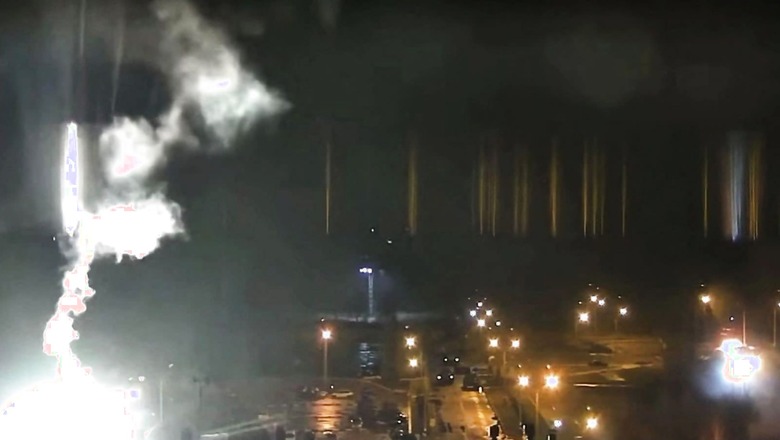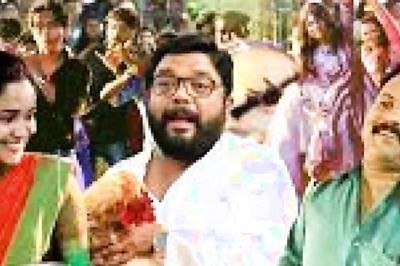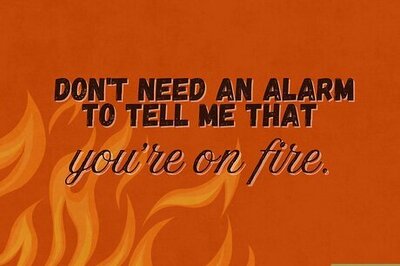
views
Even as war-hit Ukraine plans to hold a third round of talks with Russian officials this weekend, the United Nations Security Council called for an emergency meeting early on Friday after Russia attacked and seized Europe’s largest atomic power plant in Zaporizhzhia.
Ukraine has accused Russia of “nuclear terror” and the West expressed fury over the “reckless” move. Major Ukrainian cities are still facing heavy bombardment on the ninth day since Russian forces launched their offensive against their neighbouring country.
The G7 has warned against “further severe sanctions” on Russia while also calling for “rapid humanitarian corridors in Ukraine”. According to the UN, at least 331 civilians have died since the invasion, while Moscow on Wednesday said it had lost 498 soldiers. The UN also said over 1.2 million refugees have flooded from Ukraine into neighbouring countries.
Here are the top developments as Russia intensifies its invasion, even as it has become an economic, sporting and cultural pariah:
Europe’s largest atomic power plant attacked: Europe’s largest atomic power plant at Zaporizhzhia was attacked by Russian forces, which triggered an emergency meeting of the UNSC. There was fighting and a fire at the plant but the six reactors, which can power enough energy for four million homes, were apparently undamaged. Monitors reported no spike in radiation. The attack killed three Ukrainian soldiers, according to Kyiv’s nuclear operator Energoatom. Ukrainian President Volodymyr Zelenskiy said an explosion at the plant would have equalled “six Chernobyls”, referring to the site of the world’s worst nuclear disaster in 1986. A Russian UN envoy, however, denied that the Russian military had shelled the nuclear power plant. Russian defence ministry spokesman Igor Konashenkov claimed that the attack was staged by “Ukrainian sabotage groups, with the participation of foreign mercenaries”.
Third round of talks planned: After a second round of talks on Thursday, Moscow agreed to a Ukrainian request for humanitarian corridors to allow terrified residents to flee. But there was no clarity on how these would work, and no sign of any move towards a ceasefire. Ahead of a third round of talks this weekend, Zelenskiy has urged the West to step up military assistance and to “give me planes”. He also called for direct talks with Putin.
German chancellor talks to Putin: After German Chancellor Olaf Scholz telephoned Russian President Vladimir Putin urging him to end hostilities in Ukraine and allow aid, Putin denied Russia bombing Ukrainian cities and dismissed such information as “gross propaganda fakes”.
NATO rules out no-fly zone over Ukraine: Fearful of provoking its own war with nuclear-armed Russia, NATO once again ruled out enforcing a no-fly zone over Ukraine. NATO Secretary-General Jens Stoltenberg says the military organization will not police a no-fly zone over Ukraine and is warning that such a move could end in a widespread war in Europe.
Russia intensifies ground strikes: There were fresh reports of civilian casualties and devastating damage coming out of Ukraine, particularly in southern areas near Kherson, the first city to fall to Moscow’s troops. The port city of Mariupol is already cut off without water or electricity. In Chernihiv, 47 people were killed in bombings on Thursday. Parts of Kharkiv have also come under shelling, which UN prosecutors are investigating as a possible war crime.
Putin intensifies crackdown on dissent: The Kremlin said Russian President Vladimir Putin told his ally Belarusian President Alexander Lukashenko that “the tasks set for the (Ukraine) operations are going according to plan and will be fulfilled in their entirety”. The Kremlin has called on Russians “to unite around our president”, after thousands braved mass arrests at anti-war demonstrations this week. Authorities have imposed a news blackout and two liberal media groups have halted operations. Russia blocked Facebook inside the country even as multiple media websites, including the BBC, were partially inaccessible in Russia. Russian lawmakers approved legislation to impose fines and jail terms of up to 15 years for anyone publishing “fake news” about the army. Russians are also fleeing their country, as an impact of tough western sanctions, or even the Kremlin’s crackdown on domestic dissent. On one of the few remaining routes from Russia to the European Union, trains from Saint Petersburg to Finland have been packed with Russians.
India seeks local ceasefire: India sought a localised ceasefire between Russian and Ukrainian troops in eastern Ukraine to facilitate evacuation of Indian citizens trapped in conflict zones, and insisted it is yet to see the decision by the warring sides to create safe corridors for the exit of civilians materialise. Around 20,000 Indian nationals have so far crossed the borders of war-torn Ukraine to safety, the ministry of external affairs said. Prime Minister Narendra Modi, meanwhile, chaired yet another meeting to review the unfolding situation in Ukraine amid the ongoing exercise to evacuate Indian nationals, mostly students, from the country battling a Russian invasion. External Affairs Minister S Jaishankar, Union minister Piyush Goyal, and National Security Adviser Ajit Doval were among those who attended the meeting.
India to fund treatment of Delhi student shot at in Ukraine: The central government has decided to bear medical expenses of Indian student Harjot Singh, who is recovering at a hospital in Kyiv after sustaining bullet injuries, the ministry of external affairs said. On February 27, the 31-year-old along with his two friends boarded a cab for Lviv in a bid to escape. He received four bullets, including one in the chest. Singh is from Delhi. “We are aware of the case. Our embassy is in touch with them (family). He is currently I think in a hospital in Kyiv,” MEA spokesperson Arindam Bagchi said. “We are trying to ascertain his exact medical status, including his readiness to be able to move,” he added.
(With agency inputs)
Read the Latest News and Breaking News here

















Comments
0 comment